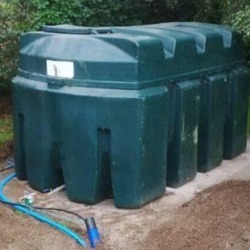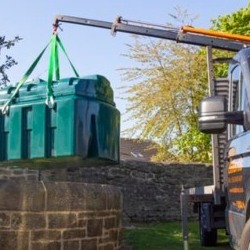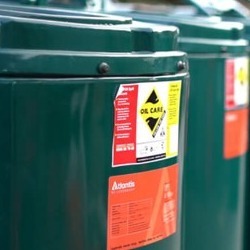The use of Atlantis EasyTank oil tanks presents several advantages:
- Minimise Leaks and Spills - the tanks are designed to prevent leaks and spills, minimising environmental contamination risks. This is crucial for maintaining the integrity of drainage systems and preventing oil from entering watercourses, which can cause significant ecological damage. The tanks feature double-walled construction, providing an extra layer of security against leaks.
- Oil Level Inspection - EasyTank oil tanks come with integrated 4” inspection hatches. These allow for real-time tracking of oil levels and early detection of potential issues, facilitating proactive maintenance and reducing the likelihood of accidental overflows. For a drainage engineer, this means fewer emergency responses and better-managed drainage networks.
- Easy Installation - the compact and modular design of Atlantis EasyTank oil tanks makes them versatile and easy to install, even in confined spaces. This flexibility is beneficial for engineers when planning and executing projects in urban or restricted areas, ensuring that oil storage needs are met without major alterations to existing structures or utilities.
Overall, Atlantis EasyTank oil tanks provide a safe, efficient, and environmentally friendly storage solution, supporting the work of civil drainage engineers in protecting and managing water resources effectively. With options from 1000 litres to 2250 litre options online and more sizes available on request, you’re sure to find the right tank for the job at Drainage Sales.
How Long Do Plastic Oil Tanks Last?
Atlantis’s EasyTanks come in a variety of styles, each one featuring a different guarantee as follows:
- Slimline Bunded Plastic Oil Tanks – 12 Year Guarantee
- Slimline Bunded Steel Oil Tanks – 10 Year Guarantee
- Single-Skin Steel Oil Storage Tanks – 3 Year Guarantee
Each tank can of course last longer than their manufacturers guarantee.
Are Steel Oil Tanks Better Than Plastic?
There is no ‘best’ material when it comes to bunded oil tanks, steel and plastic each have their own advantages and disadvantages over one another when it comes to storing oil, so in order to gain a better understanding of what’s best for you and your property, we will discuss some of the said pros and cons in more detail:
Pros And Cons Of Steel Oil Tanks
One of the key benefits of steel as a material is its durability and resistance to damage, even from extreme weather. Steel is also UV resistant; these properties allow for steel to be more resilient to accidental damage than plastic. However, steel tanks are far heavier than their plastic alternatives, making them harder to move around and install.
Pros And Cons Of Plastic Oil Tanks
Plastic tanks are easier to manoeuvre and install than steel tanks due to their lighter weight. They are also not prone to rust like steel tanks, though the risk of rust on steel is very low. Since plastic is an insulator, external heat takes longer to infiltrate into the oil inside, providing better protection. The seamless makeup of plastic tanks makes them less prone to leakages.
Plastic tanks are not as easy to recycle as steel unfortunately and are also less secure from a potential theft point of view. As mentioned when discussing steel gutters, plastic is not as resistant to accidental damage and can also be weakened over time if constantly exposed to sunlight.
What Is A Bunded Tank?
Bunded oil tanks are essentially tanks within another tank, creating a double layer between the contents stored in the tank and the outside. This means that the oil or fuel stored inside is highly protected and would need to break through two layers before it could become an issue, which also makes them more environmentally friendly than single skin tanks.
How Far Away Should An Oil Tank Be From A House?
An oil storage tank should be no closer than 1.8 metres to a building or property that is not fire-resistant.



















